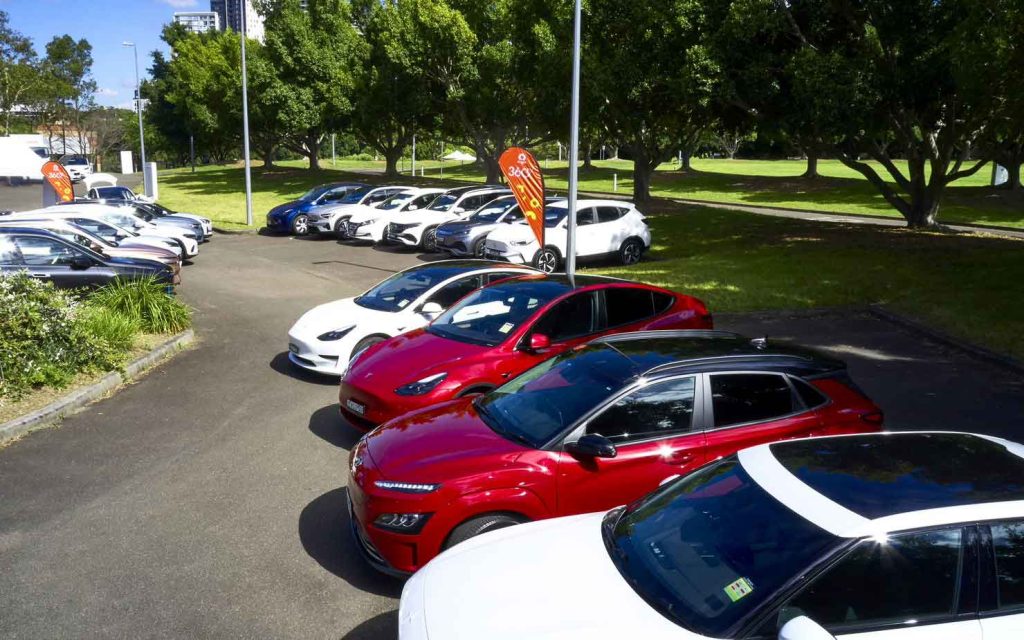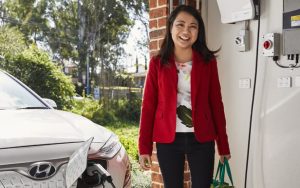Origin aims to accelerate EV fleet take-up
Business fleet users account for nearly half of all passenger vehicles sold in Australia. How can we encourage them to go electric?

What will it take to speed up the adoption of electric vehicles (EVs) among Australian business customers?
The newly launched $12.8 million Origin Accelerate EV Fleet Program aims to find out.
Part-funded with $6.2 million from ARENA, the program will see Origin Energy lease 1000 passenger EVs and 1000 smart chargers (one for each supplied EV) to fleets across the country.
The program will examine the financial implications of EV uptake in business fleets and investigate the value of smart charging systems to businesses and the electricity system.
But there are a couple of kickers in there too.
Putting 1000 new EVs on the road will in time boost the second-hand EV market. For many Australians, that should be a more affordable way to buy an EV.
And the program will also help build necessary supply chains for BEV charging and develop integration solutions. So, when Australia reaches the tipping point for EV uptake, we’ll be in a better place to satisfy demand.
Origin will supply, install and manage the charging infrastructure. Origin is partnering with fleet management organisation Custom Fleet to supply the vehicles.
The Accelerate EV Fleet Program will run until 2025.
How many EVs are we talking about?

In Jan 2022, almost 21 million registered motor vehicles of all types pounded our roads. The vast majority, around 97 per cent, of those were classified as light vehicles – cars, motorcycles and light commercial.
Light vehicles, which include 15 million passenger cars, are collectively responsible for 11 per cent of Australia’s total annual greenhouse gas emissions.
By contrast, Australians bought just 33,416 new EVs in 2022. That equates to only 3.1 per cent of more than one million new car sales in Australia per year.
The good news is EV sales are rising.
Manufacturers delivered 17,396 new vehicles during the first quarter of 2023. But that still means EVs only accounted for 6.5 per cent of sales. There is still a long way to go.
Against that backdrop, it’s worth remembering that fleet users account for nearly half of all passenger vehicles sold in Australia.
Put that way, electrifying business fleets offers a big opportunity to speed the road to an EV future.
Helping to accelerate the uptake of EVs

ARENA Acting CEO Chris Faris says the program is an exciting opportunity to scale up Australia’s emerging EV fleet leasing market.
“Origin’s program is ARENA’s largest to date targeting light vehicle fleets,” Mr Faris said.
“Not only will we be putting 1000 new electric vehicles on the road, but this program will create a blueprint for how EV fleet leasing models can operate.
“The EV Accelerate Program is about demonstrating the business case and learning the lessons that will allow that transition to gather pace.”
Origin General Manager E-Mobility, Chau Le said: “This funding from ARENA will allow us to support more business customers with their transition to EVs, helping them to reduce their carbon footprint and operating costs.
“Origin’s ambition is to lead the energy transition with cleaner and smarter customer solutions. Helping to accelerate the uptake of EVs in Australia is an important part of this.”
How ARENA prioritises land-transport decarbonisation
Decarbonisation of land transport is a key priority for ARENA
Since 2015, ARENA has announced over $146 million in funding to projects that decarbonise the transport sector, including fast charging stations, hydrogen refuelling and household smart charging.
ARENA has also supported heavy vehicle fleet operators, including Team Global Express’ Depot of the Future project, Australia’s largest order of electric trucks to date.
Even more recently, in April 2023, ARENA announced a $70 million Driving the Nation funding pool aimed at stimulating innovation around public charging stations.
All these programs help industry and consumers take necessary steps towards reducing Australia’s transport emissions in line with international commitments.
LIKE THIS STORY? SIGN UP TO OUR NEWSLETTER

ARENA